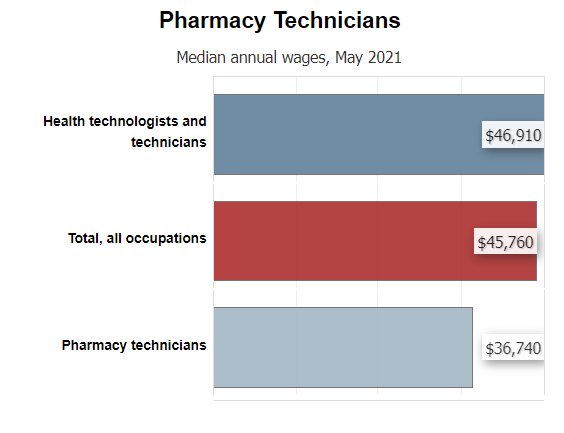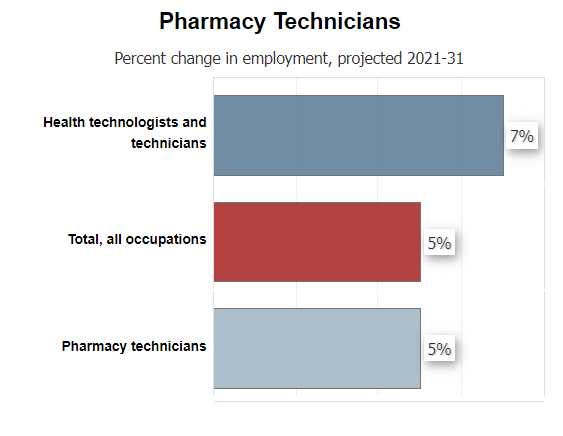Pharmacy Technicians: The Backbone of Healthcare System

Did you know?
Pharmacy technicians have been a part of the pharmacy profession for over 50 years, with the first pharmacy technician training program starting in the 1960s.
Job Description
Pharmacy technicians are essential members of the healthcare team. They work alongside pharmacists in a variety of settings, including hospitals, retail pharmacies, and long-term care facilities. Pharmacy technicians assist pharmacists in preparing and dispensing medications to patients, ensuring that they receive the right medication in the correct dosage.
General Information
Pharmacy technicians are responsible for ensuring the accuracy and safety of medication orders. They also provide customer service to patients, answer phone calls, and manage inventory. Pharmacy technicians work under the direction of a licensed pharmacist and must adhere to state and federal regulations.
Requirements
The requirements for becoming a Pharmacy Technician vary depending on the state and employer. However, in general, Pharmacy Technicians must have a high school diploma or equivalent and complete a pharmacy technician training program. Some states also require Pharmacy Technicians to pass a certification exam.
In terms of education, there are a variety of pharmacy technician training programs available, including certificate programs and associate degree programs. These programs typically include coursework in pharmacy law and ethics, medication safety, pharmaceutical calculations, and pharmacy operations.
Main Responsibilities
Pharmacy Technicians are responsible for a range of tasks in a pharmacy setting. They work under the supervision of a licensed pharmacist and may perform duties such as:
- Filling and dispensing prescriptions: Pharmacy Technicians are responsible for filling prescriptions and ensuring that the medication is dispensed accurately.
- Labeling and packaging medication: They label medication with the patient's name and other important information, and package them appropriately.
- Managing inventory: Pharmacy Technicians monitor the inventory of medication and supplies, and order new stock when necessary.
- Processing insurance claims: They work with insurance companies to process claims and ensure that patients receive their medication.
- Providing customer service: They assist customers with their medication needs, answer questions about medications, and provide information on dosage and side effects.
Additional duties
In addition to their main responsibilities, Pharmacy Technicians may also be required to perform other duties, such as:
- Compounding medication: They may be responsible for compounding medication under the supervision of a pharmacist.
- Managing pharmacy records: Pharmacy Technicians are responsible for maintaining accurate records of medication and prescription information.
- Administering vaccines: In some states, Pharmacy Technicians may be authorized to administer vaccines under the supervision of a pharmacist.
Prior to the creation of pharmacy technician positions, pharmacists were responsible for all aspects of medication dispensing, including filling prescriptions, compounding medications, and managing inventory.
Skills
Pharmacy Technicians require a mix of hard and soft skills to be successful in their role. Some important skills for Pharmacy Technicians include:
- Attention to detail: Pharmacy Technicians must be able to accurately fill and dispense medications and maintain accurate records.
- Communication skills: They must be able to communicate effectively with patients, healthcare providers, and insurance companies.
- Math skills: Pharmacy Technicians must be able to perform calculations to ensure that the correct dosage of medication is dispensed.
- Computer skills: They must be able to use pharmacy software and databases to manage inventory and process insurance claims.
- Customer service skills: Pharmacy Technicians must be able to provide excellent customer service to patients and assist them with their medication needs.
Salary

Source: U.S. Bureau of Labor Statistics
The average salary for pharmacy technicians in the United States is $36,740 per year, according to the Bureau of Labor Statistics (BLS). The best-paid 25% made $45,850 in 2021, while the lowest-paid 25% made $29,460. However, the salary range can vary depending on a variety of factors, including location, level of education and experience, and type of employer.
Differentiation by States
The salary range for pharmacy technicians can vary significantly by state. According to the BLS, the highest-paying states for pharmacy technicians are Alaska, California, Washington, Oregon, and Vermont. In these states, pharmacy technicians earn an average annual salary ranging from $44,570 to $51,450. On the other hand, the lowest-paying states are West Virginia, Alabama, and South Dakota, where the average annual salary ranges from $26,890 to $29,690.
Factors That Influence Earnings
Several factors can influence the salary of a pharmacy technician. These include:
- Experience: Pharmacy technicians with more experience typically earn more than those who are new to the field.
- Education: Pharmacy technicians who hold advanced degrees or certifications may earn higher salaries than those who do not.
- Type of employer: Pharmacy technicians who work in hospitals or other healthcare facilities may earn more than those who work in retail pharmacies.
- Location: As mentioned, the salary range for pharmacy technicians can vary by state or even city.
Ways to Improve Earnings
There are several ways for pharmacy technicians to increase their earning potential. One of the most effective ways is to obtain certification through the Pharmacy Technician Certification Board (PTCB) or the National Healthcareer Association (NHA). Certification can help demonstrate a technician's competency and increase their chances of being hired or promoted.
Pharmacy technicians can also seek additional training or education in areas such as pharmacology or inventory management. This can help them take on more advanced roles within their organization and potentially earn a higher salary.
Additional Benefits
In addition to salary, pharmacy technicians may be eligible for additional benefits such as health insurance, retirement plans, paid time off, and tuition reimbursement. These benefits can vary depending on the employer and level of experience.
Did you know?
The first pharmacy technician certification exam was administered in 1978 by the Pharmacy Technician Certification Board (PTCB).
Job Environment
Pharmacy technicians work in a variety of settings, including retail pharmacies, hospitals, and long-term care facilities. The job environment for pharmacy technicians varies depending on the setting they work in, as well as the tools and equipment they use.
Retail Pharmacy Setting
Pharmacy technicians who work in retail settings typically work in drugstores or supermarkets. They work alongside pharmacists to ensure that patients receive their prescribed medications in a timely and efficient manner. In this setting, pharmacy technicians are responsible for a range of tasks, including preparing prescription labels, counting and measuring medication doses, and processing insurance claims.
The tools and equipment used in a retail pharmacy setting include computers, cash registers, prescription bottles and labels, and medication measuring devices. Pharmacy technicians must be skilled in using these tools and equipment to ensure that medications are accurately dispensed and processed.
Work schedules for pharmacy technicians in retail settings may vary, but typically include some evening and weekend shifts to accommodate the needs of patients who require medications outside of regular business hours.
Hospital and Long-Term Care Facility Setting
Pharmacy technicians who work in hospital and long-term care facility settings play an important role in ensuring that patients receive the appropriate medications and doses. In these settings, pharmacy technicians work under the supervision of a licensed pharmacist to prepare medications, maintain medication inventory, and process medication orders.
The tools and equipment used in a hospital or long-term care facility setting include automated dispensing machines, medication carts, and electronic health record systems. Pharmacy technicians must be skilled in using these tools and equipment to ensure that medications are accurately prepared and administered.
Work schedules for pharmacy technicians in hospital and long-term care facility settings may vary, but typically include rotating shifts to ensure that medication orders are processed and dispensed around the clock.

Photo: gpointstudio/freepik
The average age of an employed pharmacist technician is 38 years old.
Education
To become a pharmacy technician, individuals typically need to complete a formal education program that provides both theoretical and practical training. The specific requirements for these programs can vary depending on the state and the institution offering the training.
In general, pharmacy technician programs are offered at community colleges, vocational schools, and other educational institutions. The programs may vary in length, but most take around 6-12 months to complete.
Classroom instruction typically covers topics such as pharmacology, pharmacy law and ethics, medication safety, and drug interactions. Students may also learn about pharmaceutical calculations, medical terminology, and the basics of patient care.
In addition to classroom instruction, pharmacy technician programs also include practical training in a clinical setting, such as a hospital or retail pharmacy. This hands-on experience allows students to apply the knowledge they have learned in the classroom and gain valuable experience working with patients and healthcare professionals.
Upon completion of a pharmacy technician program, graduates may be eligible to take a certification exam offered by organizations such as the Pharmacy Technician Certification Board (PTCB) or the National Healthcareer Association (NHA). Certification is not always required to work as a pharmacy technician, but it can improve job prospects and demonstrate a commitment to the profession.
Bachelor's Degree
A Bachelor's degree in Pharmacy Technician is not a common requirement for this profession. However, some universities may offer a Bachelor's program that provides students with a broader understanding of pharmaceuticals, health sciences, and business practices. This degree may take four years to complete and includes courses in chemistry, biology, pharmacology, medical terminology, and healthcare administration.
Master's Degree
There is no Master's Degree specifically in Pharmacy Technician. However, some pharmacy technicians may choose to pursue a Master's Degree in Pharmacy, which can open up career opportunities in research, administration, or academia. This degree typically takes two years to complete and includes advanced courses in drug development, pharmacology, and patient care.
Ph.D.
Pharmacy technicians do not typically require a Ph.D. degree. However, individuals who are interested in research and development may choose to pursue a Ph.D. in Pharmacy or a related field. A Ph.D. in Pharmacy can take 3-5 years to complete and involves intensive research and coursework in pharmacology, drug development, and drug delivery.
Postdoctoral Fellowship
Postdoctoral fellowships are available for individuals who have completed their Ph.D. in Pharmacy or a related field. These fellowships provide advanced training and research opportunities in a specific area of pharmacy, such as drug development, clinical trials, or patient care. The duration of these fellowships varies but can last anywhere from one to three years.
Professional Associations
Pharmacy technicians can join professional associations, such as the National Pharmacy Technician Association (NPTA) or the American Society of Health-System Pharmacists (ASHP). These associations provide networking opportunities, continuing education courses, and resources to help pharmacy technicians stay up-to-date on the latest trends and developments in the field.
Licenses and Certifications
The requirements for licensure and certification vary by state, but typically involve passing an exam and completing continuing education courses to maintain certification. Some common certifications for pharmacy technicians include the Certified Pharmacy Technician (CPhT) certification offered by the Pharmacy Technician Certification Board (PTCB) and the National Healthcareer Association's (NHA) Certified Pharmacy Technician (CPhT) certification.
In 2019, the National Association of Boards of Pharmacy (NABP) launched the Pharmacy Technician Certification Exam (PTCE), a new certification exam for pharmacy technicians.
Did you know?
In 2019, the National Association of Boards of Pharmacy (NABP) launched the Pharmacy Technician Certification Exam (PTCE), a new certification exam for pharmacy technicians.
Career Paths
While the career path for pharmacy technicians can be rewarding, many individuals may be interested in exploring opportunities for career development and advancement.
Ways of Career Development
One of the most common ways for pharmacy technicians to advance their careers is to gain experience and pursue additional education and training. This can include completing continuing education courses, pursuing certification in specialized areas of pharmacy practice, and even going back to school to earn a degree.
Pharmacy technicians may also consider taking on leadership roles within their workplace or pursuing opportunities to mentor new technicians. By demonstrating strong communication, organizational, and leadership skills, pharmacy technicians can set themselves apart and advance their careers.
Subfields
One way that pharmacy technicians can expand their career options is by pursuing opportunities within subfields of the pharmacy profession. For example, some pharmacy technicians may choose to specialize in areas such as compounding, sterile products, or medication therapy management. In these roles, technicians work alongside pharmacists to provide specialized care and services to patients with complex medication needs.
Compounding pharmacy technicians may work in specialty pharmacies or hospitals to prepare customized medications for individual patients. This may involve compounding sterile products, such as injections or intravenous (IV) medications, or non-sterile products, such as topical creams or suppositories.
Sterile products technicians work in environments such as hospitals and clean rooms to prepare sterile medications and solutions for patients. This requires specialized knowledge of sterile techniques, cleanroom protocols, and aseptic processing.
Medication therapy management (MTM) technicians work closely with pharmacists to help patients manage their medications and optimize their health outcomes. MTM technicians may conduct medication reviews, provide patient education, and help coordinate care between healthcare providers.
Specialization
Another way that pharmacy technicians can pursue career development is by specializing in a specific area of pharmacy practice. Specialization can help technicians to gain a deeper understanding of a particular area of pharmacy and may lead to opportunities for increased responsibility and advancement.
One example of a specialized area of pharmacy practice is oncology pharmacy. Oncology pharmacy technicians work in cancer centers and hospitals to prepare and dispense chemotherapy medications, as well as manage the side effects and complications of cancer treatment. Oncology pharmacy technicians may need to obtain additional training or certification in this specialized area of pharmacy practice.
Other areas of specialization in pharmacy include nuclear pharmacy, pediatric pharmacy, and psychiatric pharmacy. Each of these areas requires specialized knowledge and skills, and may offer opportunities for career advancement and increased earning potential.
Alternative Careers and Similar Jobs
Career Option | Job Description |
Pharmacy Technology Instructor | Instruct and train future pharmacy technicians in educational settings |
Pharmaceutical Sales Representative | Promote and sell medications to healthcare providers on behalf of pharmaceutical companies |
Medical Assistant | Assist healthcare providers with clinical and administrative tasks |
Medical Billing and Coding Specialist | Code and process medical claims and invoices for reimbursement |
Clinical Research Coordinator | Assist with research studies involving medications in clinical settings |
Pharmacy Manager | Oversee the day-to-day operations of a pharmacy, including staffing, inventory management, and customer service |
Pharmacy Technology Consultant | Work for companies that develop and market pharmacy technology solutions, such as software for medication management or automation systems for prescription filling |
Pharmacy Benefit Manager (PBM) Analyst | Work for third-party companies that manage prescription drug benefits for health insurance plans, ensuring that patients receive appropriate medication coverage |
Pharmacy Regulatory Affairs Specialist | Work for pharmaceutical companies, ensuring that new medications comply with all relevant regulations and requirements |
Pharmacy Buyer | Purchase medications and other supplies for pharmacies and other departments in healthcare organizations |
According to BLS as on May 2021 there were 436,630 pharmacy technicians working across the nation.
Job Market

Source: U.S. Bureau of Labor Statistics
If you are considering a career as a pharmacy technician, it is important to understand the demand for these professionals, the job outlook, and the possibilities of part-time and remote work.
Demand for Pharmacy Technicians
The demand for pharmacy technicians is on the rise, driven by several factors. As the population ages and requires more medications, the need for pharmacy services is increasing. Additionally, the expansion of health insurance coverage under the Affordable Care Act has led to an increase in the number of people seeking healthcare services, including prescription medications. Finally, advances in technology and automation have made it possible for pharmacies to handle more prescriptions, leading to an increased demand for pharmacy technicians.
Outlook of Pharmacy Technician Jobs
According to the Bureau of Labor Statistics, employment of pharmacy technicians is projected to grow 5% from 2021 to 2031, which is about as fast as the average for all occupations. The growth in demand for prescription medications is expected to continue, driving the need for pharmacy services and creating job opportunities for pharmacy technicians.
In addition to traditional retail pharmacies, there are also opportunities for pharmacy technicians in hospitals, long-term care facilities, and mail-order pharmacies. These settings may offer higher salaries and additional benefits, such as health insurance and retirement plans.
Possibilities of Part-Time and Remote Work
Pharmacy technicians may have opportunities for part-time and remote work, depending on their employer and location. Retail pharmacies may offer part-time positions to accommodate employees' schedules or to meet fluctuating demand. However, it is important to note that part-time positions may not offer the same benefits as full-time positions.
Remote work may also be a possibility for pharmacy technicians, particularly in roles such as medication therapy management or telepharmacy. In these roles, pharmacy technicians may work from home or another location, communicating with patients and healthcare providers via phone or video conference. However, remote work opportunities may be limited and require specific skills and qualifications.
Job Satisfaction
While the job can be challenging at times, it can also be very rewarding for those who enjoy working in a fast-paced environment and helping others. Here are some of the advantages and disadvantages of being a pharmacy technician:
Advantages
- Job Stability: As the demand for healthcare services continues to grow, the need for pharmacy technicians is also on the rise. This means that there will always be job opportunities for those who want to pursue a career in this field.
- Competitive Salary: Pharmacy technicians typically earn a competitive salary, which can vary depending on their experience and location.
- Flexible Work Schedule: Many pharmacy technicians have the option of working part-time or full-time, which can be a great option for those who need a flexible work schedule to balance other responsibilities such as school or family obligations.
- Career Advancement Opportunities: Pharmacy technicians who want to advance their careers can do so by pursuing additional education or certification, or by gaining experience in a specialized area such as compounding or IV medication preparation.
Disadvantages
- High-Stress Environment: Pharmacy technicians work in a fast-paced environment and are often required to handle multiple tasks at once. This can be stressful for some people, especially those who have difficulty handling pressure.
- Repetitive Tasks: Much of a pharmacy technician's job involves routine tasks such as counting pills and preparing prescriptions. This can become monotonous for some people who prefer more variety in their work.
- Risk of Exposure to Hazardous Materials: Pharmacy technicians are exposed to hazardous materials such as chemicals and drugs on a regular basis, which can be harmful if proper safety protocols are not followed.
- Limited Scope of Practice: Pharmacy technicians are not authorized to perform certain tasks such as prescribing medication or providing medical advice to patients. This can be frustrating for some individuals who want to take on a more expansive role in patient care.
Did you know?
In the 1980s, many states began to regulate the practice of pharmacy technicians, requiring them to complete training programs and pass certification exams.
Government Programs
Governments at various levels have created programs to support and promote the profession.
State Pharmacy Technician Training Programs
Many states offer training programs for aspiring pharmacy technicians. These programs are designed to provide students with the necessary knowledge and skills to work in a pharmacy setting. These programs vary in length, from a few weeks to several months. Upon completion, graduates receive a certificate or diploma in pharmacy technology, which can increase their chances of finding employment.
Federal Workforce Programs
The federal government also offers workforce development programs for pharmacy technicians. One such program is the Workforce Innovation and Opportunity Act (WIOA), which provides funding to states to support workforce development programs. Under this program, eligible individuals can receive training in a variety of fields, including pharmacy technology.
Military Programs
Pharmacy technicians can also find opportunities in the military. The military offers a Pharmacy Specialist training program, which provides specialized training in pharmacy technology. Upon completion of the program, graduates can work in military pharmacies or civilian settings.
Medicare Part D
Medicare Part D is a federal program that provides prescription drug coverage to eligible individuals. Pharmacy technicians play a crucial role in this program, as they work with pharmacists to ensure that patients receive the appropriate medications and dosage. This program creates job opportunities for pharmacy technicians and provides them with the opportunity to work with a diverse patient population.
State and Federal Regulatory Agencies
State and federal regulatory agencies also employ pharmacy technicians. These agencies are responsible for ensuring that pharmacies comply with state and federal regulations. Pharmacy technicians who work for these agencies play a crucial role in ensuring that pharmacies meet these requirements and provide safe and effective medication management to patients.
- Pharmacy Technicians play a critical role in the healthcare system, ensuring that patients receive accurate and timely access to the medications they need.
- The average salary for pharmacy technicians is $36,740 per year, but this can vary significantly depending on location, education, and experience.
- To become a pharmacy technician, individuals must complete a formal education program that includes both classroom instruction and practical training.
- The demand for pharmacy technicians is growing, driven by factors such as an aging population and advances in technology.
- Part-time and remote work may be possibilities for pharmacy technicians, depending on their employer and role.
- While the job can be demanding at times, it can also be very rewarding for those who enjoy working in a fast-paced environment and helping others.
- Pharmacy technicians have access to a range of government programs that support their education, training, and career development.
FAQ
What is a pharmacy technician?
A pharmacy technician is a healthcare professional who works under the supervision of a licensed pharmacist to dispense medications to patients.
What does a pharmacy technician do?
Pharmacy technicians are responsible for a variety of tasks, including counting pills, labeling bottles, processing insurance claims, and answering patient questions.
What kind of education or training is required to become a pharmacy technician?
The requirements typically include completing a training program, passing a certification exam, and obtaining a license or registration from the state board of pharmacy.
Where do pharmacy technicians work?
Pharmacy technicians can work in a variety of settings, including retail pharmacies, hospitals, long-term care facilities, and mail-order pharmacies.
Can pharmacy technicians become pharmacists?
Yes, some pharmacy technicians go on to become pharmacists by completing additional education and training.
Are pharmacy technicians licensed or certified?
In many states, pharmacy technicians are required to be licensed or registered with the state board of pharmacy, and many also obtain certification through organizations such as the Pharmacy Technician Certification Board (PTCB) or the National Healthcareer Association (NHA).